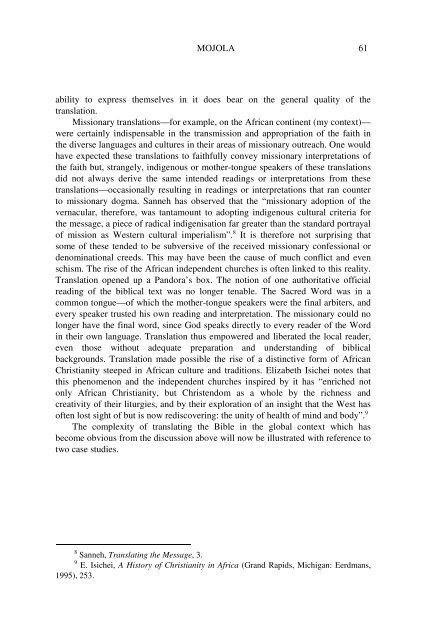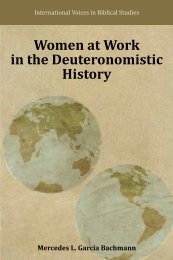Global Hermeneutics? - International Voices in Biblical Studies ...
Global Hermeneutics? - International Voices in Biblical Studies ...
Global Hermeneutics? - International Voices in Biblical Studies ...
You also want an ePaper? Increase the reach of your titles
YUMPU automatically turns print PDFs into web optimized ePapers that Google loves.
MOJOLA 61<br />
ability to express themselves <strong>in</strong> it does bear on the general quality of the<br />
translation.<br />
Missionary translations—for example, on the African cont<strong>in</strong>ent (my context)—<br />
were certa<strong>in</strong>ly <strong>in</strong>dispensable <strong>in</strong> the transmission and appropriation of the faith <strong>in</strong><br />
the diverse languages and cultures <strong>in</strong> their areas of missionary outreach. One would<br />
have expected these translations to faithfully convey missionary <strong>in</strong>terpretations of<br />
the faith but, strangely, <strong>in</strong>digenous or mother-tongue speakers of these translations<br />
did not always derive the same <strong>in</strong>tended read<strong>in</strong>gs or <strong>in</strong>terpretations from these<br />
translations—occasionally result<strong>in</strong>g <strong>in</strong> read<strong>in</strong>gs or <strong>in</strong>terpretations that ran counter<br />
to missionary dogma. Sanneh has observed that the “missionary adoption of the<br />
vernacular, therefore, was tantamount to adopt<strong>in</strong>g <strong>in</strong>digenous cultural criteria for<br />
the message, a piece of radical <strong>in</strong>digenisation far greater than the standard portrayal<br />
of mission as Western cultural imperialism”. 8 It is therefore not surpris<strong>in</strong>g that<br />
some of these tended to be subversive of the received missionary confessional or<br />
denom<strong>in</strong>ational creeds. This may have been the cause of much conflict and even<br />
schism. The rise of the African <strong>in</strong>dependent churches is often l<strong>in</strong>ked to this reality.<br />
Translation opened up a Pandora’s box. The notion of one authoritative official<br />
read<strong>in</strong>g of the biblical text was no longer tenable. The Sacred Word was <strong>in</strong> a<br />
common tongue—of which the mother-tongue speakers were the f<strong>in</strong>al arbiters, and<br />
every speaker trusted his own read<strong>in</strong>g and <strong>in</strong>terpretation. The missionary could no<br />
longer have the f<strong>in</strong>al word, s<strong>in</strong>ce God speaks directly to every reader of the Word<br />
<strong>in</strong> their own language. Translation thus empowered and liberated the local reader,<br />
even those without adequate preparation and understand<strong>in</strong>g of biblical<br />
backgrounds. Translation made possible the rise of a dist<strong>in</strong>ctive form of African<br />
Christianity steeped <strong>in</strong> African culture and traditions. Elizabeth Isichei notes that<br />
this phenomenon and the <strong>in</strong>dependent churches <strong>in</strong>spired by it has “enriched not<br />
only African Christianity, but Christendom as a whole by the richness and<br />
creativity of their liturgies, and by their exploration of an <strong>in</strong>sight that the West has<br />
often lost sight of but is now rediscover<strong>in</strong>g: the unity of health of m<strong>in</strong>d and body”. 9<br />
The complexity of translat<strong>in</strong>g the Bible <strong>in</strong> the global context which has<br />
become obvious from the discussion above will now be illustrated with reference to<br />
two case studies.<br />
8 Sanneh, Translat<strong>in</strong>g the Message, 3.<br />
9 E. Isichei, A History of Christianity <strong>in</strong> Africa (Grand Rapids, Michigan: Eerdmans,<br />
1995), 253.




